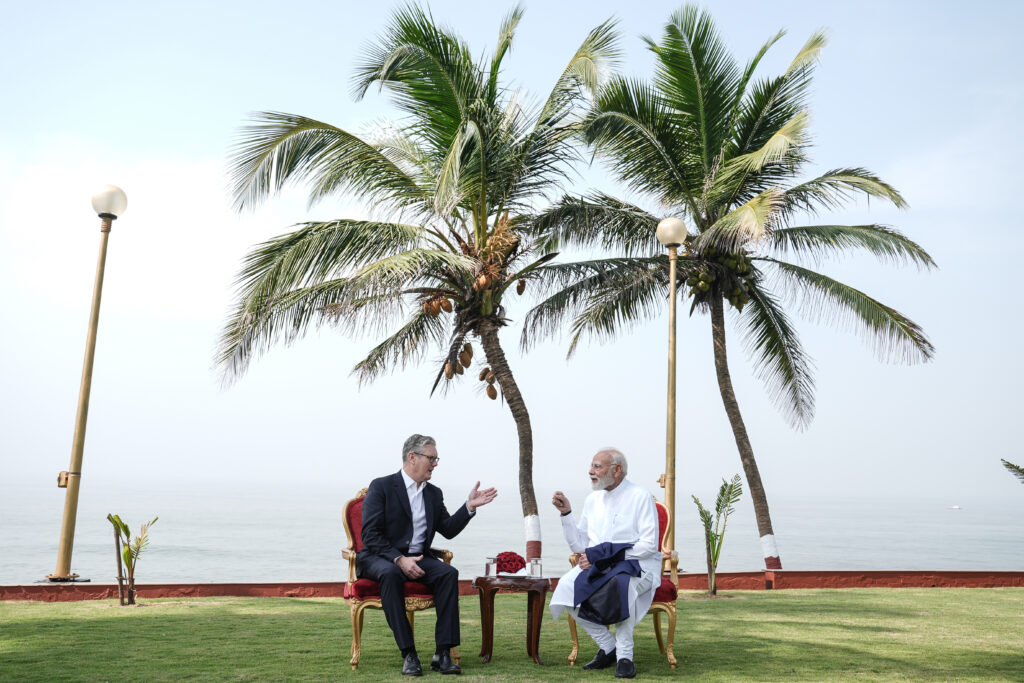Indian Prime Minister Narendra Modi told his British counterpart Keir Starmer on Thursday that relations had made “significant progress”, as they pledged to unlock “unparalleled” economic opportunities.Starmer is on his first visit to India as premier, accompanied by a 125-member delegation, after the two countries signed a trade deal in London in July.Under the accord, India will slash tariffs on imports of British goods such as whisky, cosmetics and medical devices, while Britain will reduce duties on clothing, footwear and food products, including frozen prawns from India.”This agreement will reduce import costs between our two countries, create new employment opportunities for youth, boost trade, and benefit both our industry and consumers,” Modi said.He told his “friend” Starmer that his visit “symbolises the new energy” in ties between the nations. “Together we will build a bright future for the people of both countries”, he told Starmer, speaking in Hindi.India and its former colonial ruler share bilateral trade worth around $54.8 billion and investments supporting more than 600,000 jobs across both countries.India’s became the world’s fifth-largest economy in 2022, when its GDP overtook Britain’s, according to IMF figures. It is tipped to overtake Japan as the fourth largest later this year.”India’s growth story is remarkable,” Starmer said, noting New Delhi’s ambition to become the world’s third largest economy by 2028.”Everything I’ve seen since I’ve been here is absolute proof to me that you’re on track to succeed in that,” Starmer said. “So, we want to be partners on that journey.”Starmer, who returns to London later on Thursday, said he expected by his departure to have “secured major new investments, creating thousands of high-skilled jobs” for both nations.”My visit this week is about doubling down on the potential of our trade deal for the benefit of all of us”, Starmer said.The leaders also announced a defence cooperation deal, as well pushing education ties, including support for the nine British universities opening campuses in India.
Indian Prime Minister Narendra Modi told his British counterpart Keir Starmer on Thursday that relations had made “significant progress”, as they pledged to unlock “unparalleled” economic opportunities.Starmer is on his first visit to India as premier, accompanied by a 125-member delegation, after the two countries signed a trade deal in London in July.Under the accord, India will slash tariffs on imports of British goods such as whisky, cosmetics and medical devices, while Britain will reduce duties on clothing, footwear and food products, including frozen prawns from India.”This agreement will reduce import costs between our two countries, create new employment opportunities for youth, boost trade, and benefit both our industry and consumers,” Modi said.He told his “friend” Starmer that his visit “symbolises the new energy” in ties between the nations. “Together we will build a bright future for the people of both countries”, he told Starmer, speaking in Hindi.India and its former colonial ruler share bilateral trade worth around $54.8 billion and investments supporting more than 600,000 jobs across both countries.India’s became the world’s fifth-largest economy in 2022, when its GDP overtook Britain’s, according to IMF figures. It is tipped to overtake Japan as the fourth largest later this year.”India’s growth story is remarkable,” Starmer said, noting New Delhi’s ambition to become the world’s third largest economy by 2028.”Everything I’ve seen since I’ve been here is absolute proof to me that you’re on track to succeed in that,” Starmer said. “So, we want to be partners on that journey.”Starmer, who returns to London later on Thursday, said he expected by his departure to have “secured major new investments, creating thousands of high-skilled jobs” for both nations.”My visit this week is about doubling down on the potential of our trade deal for the benefit of all of us”, Starmer said.The leaders also announced a defence cooperation deal, as well pushing education ties, including support for the nine British universities opening campuses in India.
